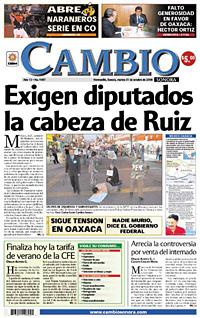 |
 |
 |
 Travel Writers' Resources | June 2007 Travel Writers' Resources | June 2007  
The Mexican Press in Peril
 Tim Padgett - Time.com Tim Padgett - Time.com


| | Violence caused the newspaper Cambio Sonora, published in Hermosillo, to announce on May 24 that it was temporarily shutting down. |
Beheadings and murders of police would seem like ideal grist for opportunistic news organizations. So why are some parts of the Mexican press staying silent during the recent savage fighting between drug cartels? Because they themselves are in the crosshairs.

The most recent victim was the newspaper Cambio Sonora, published in Hermosillo, the capital of the state of Sonora. Violence - including two grenade attacks on its offices - caused the newspaper to announce on May 24 that it was temporarily shutting down. Seven journalists have been murdered in Mexico since October, mostly in retaliation for reporting on the drug cartels. And two television reporters covering the crisis went missing this month.

In some places, like the bloodied border city of Nuevo Laredo, frightened media simply avoid covering the violence. But Cambio Sonora is the first paper to close. "It's huge," says Carlos Lauria, Americas coordinator for the New York-based Committee to Protect Journalists (CPJ). "It points up the inability of the Mexican authorities to provide security in the face of this threat."

The crisis also proves how successful the strategy of terrorist intimidation has been. The CPJ, in fact, is investigating a growing number of reports about Mexican journalists who have become well-paid "publicists" for one cartel or the other - inserting material into their newspapers or broadcasts, for example, that can burnish a kingpin's image or tarnish that of a rival.

Since taking office last December, Mexican President Felipe Calderón has deployed almost 25,000 army troops to battle the cartels. So far, the bloodshed has only escalated. And now, there are fewer people left to honestly report what's happening on the ground.
Mexico: Reporter Abducted, Beaten, Freed
Associated Press

A crime reporter for a newspaper in northern Mexico was abducted, beaten and released by his captors, the latest in a wave of attacks against journalists, a Mexican watchdog group said Wednesday.

Onesimo Zuniga, who works from the city of Gomez Palacio, was held for nine hours by three men on May 23, according to the Center of Journalism and Public Ethics.

A reporter for the Torreon-based newspaper El Sol de La Laguna, Zuniga was abducted after dropping off his daughter at school and driven to a remote location, the journalism advocacy group said.

Zuniga told his newspaper that the men told him they had "personal grievances."

Mexico has become the world's second-most dangerous place for journalists after Iraq with seven journalists killed across the country since October. A Mexican TV reporter and cameraman disappeared this month in the northern city of Monterrey.

Many journalists hold back from reporting on drug gangs out of fear the cartels will retaliate.

Last week, the newspaper Cambio Sonora in the northwestern city of Hermosillo announced it was shutting down temporarily after assailants tossed a hand grenade from a passing car at its offices.

On Wednesday, non-governmental organizations and press freedom groups noted in a report that attacks on journalists in Mexico has risen markedly in recent years, and are increasingly the work of drug traffickers.

"Today, Mexican journalists don't just suffer obstruction, threats or censorship from powerful public or economic figures," said the report, compiled in part by the Manuel Buendia Foundation, a group named for a crusading Mexican journalist assassinated in 1984. "In the last four years, drug traffickers have become some of the main culprits in ever-more-frequent killings and attacks on journalists, particularly in the north of the country." | 
 | |
 |



